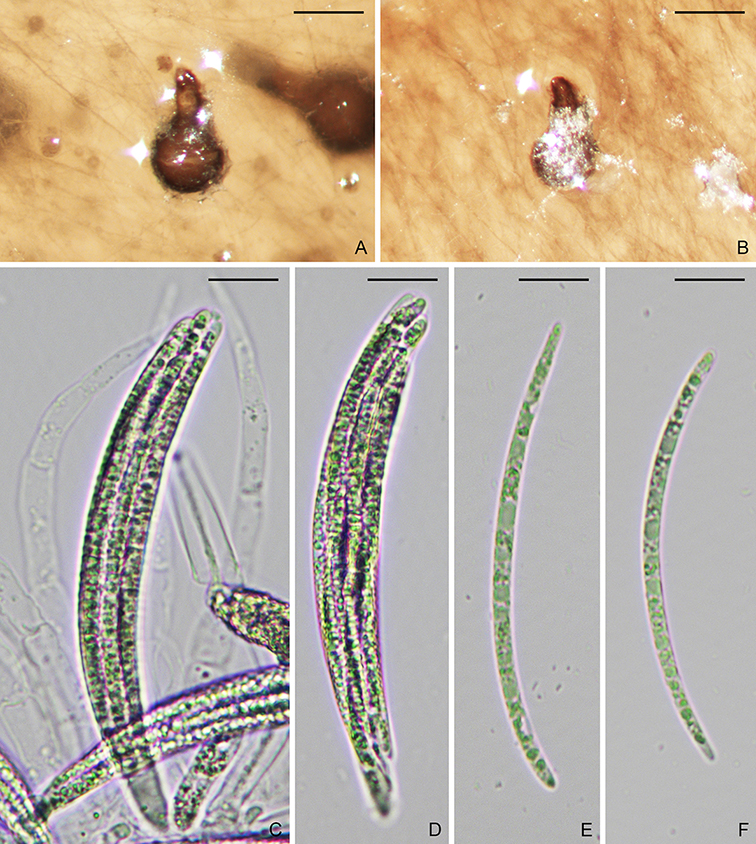
Figure. Gaeumannomyces oryzicola (CBS141390). A–B. Ascomata. C–D. Asci. E–F. Ascospores. Scale bars: A–B = 200 µm, C–F = 10 µm.
Gaeumannomyces oryzicola Hern.-Restr. & Crous, Stud. Mycol. 83: 41 (2016).
MycoBank: MB816898.
Ascomata perithecial, superficial to immersed, solitary to gregarious, globose to subglobose, dark brown to black, 200–500 × 150–485 µm diam, with a cylindrical, dark brown neck, 80–165 × 60–90 µm. Paraphyses septate, hyaline, dissolving at maturity. Asci 8-spored, unitunicate, clavate, 125–155 × 12–16 µm, with a refractive ring. Ascospores parallel in ascus, filiform to fusiform, curved, 0–5-septate, not constricted at septum, hyaline to yellowish, smooth, 95–135 × 4–6.5 µm. Asexual state phialophora-like. On CMA with sterile rice seeds, hyphae branched, septate, hyaline to brown, smooth, 2–5 μm diam. Conidiophores simple, unbranched, hyaline. Conidiogenous cells phialidic, terminal to intercalary, solitary, cylindrical, straight or curved, hyaline, 7.5–20.5 × 2–2.5 μm, with a cylindrical, refractive collarette, up to 3 μm long, 1.5–2 μm diam. Conidia lunate, allantoid to fusiform, slightly or strongly curved, hyaline, 5–9 × 1.5–2.5 μm (Asexual state description from Hernández-Restrepo et al., 2016).
Typification: Holotype CBSH-26063. Ex-holotype culture CBS141390 (CPC26063).
Gene sequences: KX306516 (ITS), KX306586 (28S), KX306646 (RPB1), KX306717 (TEF1).
Specimens examined: USA, Texas, on Oryza sativa, prior to 1992, J. Krausz, CBS141390 (CPC26063).
Hosts/substrates: On Oryza sativa (Poaceae).
References:
Hernández-Restrepo M, Groenewald JZ, Elliott ML, Canning G, McMillan VE, Crous PW. 2016. Take-all or nothing. Studies in Mycology 83:19–48.
Geographical distribution: USA, Texas.
Copyright 2022 by The American Phytopathological Society. Reproduced, by permission, from Luo, J., and Zhang, N. 2022. The Rice Blast Fungus and Allied Species: A Monograph of the Fungal Order Magnaporthales (https://my.apsnet.org/APSStore/Product-Detail.aspx?WebsiteKey=2661527A-8D44-496C-A730-8CFEB6239BE7&iProductCode=46826). American Phytopathological Society, St. Paul, MN.